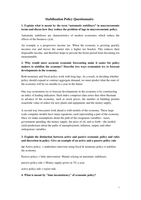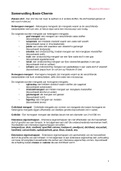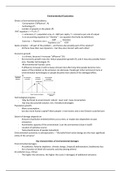Stabilization Policy Questionnaire
1. Explain what is meant by the term “automatic stabilisers” in macroeconomic
terms and discus how they reduce the problem of lags in macroeconomic policy.
Automatic stabilisers are characteristics of modern economies which reduce the
effects of the business cycle.
An example is a progressive income tax. When the economy is growing quickly
incomes rise and moves the earner into a higher tax bracket. This reduces their
disposable income, and therefore helps to prevent the boom period from becoming too
unsustainable.
2. Why would more accurate economic forecasting make it easier for policy
makers to stabilize the economy? Describe two ways economists try to forecast
developments in the economy.
Both monetary and fiscal policy work with long lags. As a result, in deciding whether
policy should expand or contract aggregate demand, we must predict what the state of
the economy will be six months to a year in the future.
One way economists try to forecast developments in the economy is by constructing
an index of leading indicators. Such index comprises data series that often fluctuate
in advance of the economy, such as stock prices, the number of building permits
issued,the value of orders for new plants and equipment, and the money supply.
A second way forecasters look ahead is with models of the economy. These large
scale computer models have many equations, each representing a part of the economy.
Once we make assumptions about the path of the exogenous variables—taxes,
government spending, the money supply, the price of oil, and so forth—the models
yield predictions about the paths of unemployment, inflation, output, and other
endogenous variables.
3. Explain the distinction between active and passive economic policy and rules
and discretion in policy. Give an example of an active and a passive policy rule
(a) Active policy = authorities intervene using fiscal & monetary policy ti stabilize
the economy.
Passive policy = little intervention. Mainly relying on automatic stabilizers.
passive policy rule = Money supply grows at 3% a year.
active policy rule = taylor rule.
4. What is meant by "time inconsistency" of economic policy?
1
1. Explain what is meant by the term “automatic stabilisers” in macroeconomic
terms and discus how they reduce the problem of lags in macroeconomic policy.
Automatic stabilisers are characteristics of modern economies which reduce the
effects of the business cycle.
An example is a progressive income tax. When the economy is growing quickly
incomes rise and moves the earner into a higher tax bracket. This reduces their
disposable income, and therefore helps to prevent the boom period from becoming too
unsustainable.
2. Why would more accurate economic forecasting make it easier for policy
makers to stabilize the economy? Describe two ways economists try to forecast
developments in the economy.
Both monetary and fiscal policy work with long lags. As a result, in deciding whether
policy should expand or contract aggregate demand, we must predict what the state of
the economy will be six months to a year in the future.
One way economists try to forecast developments in the economy is by constructing
an index of leading indicators. Such index comprises data series that often fluctuate
in advance of the economy, such as stock prices, the number of building permits
issued,the value of orders for new plants and equipment, and the money supply.
A second way forecasters look ahead is with models of the economy. These large
scale computer models have many equations, each representing a part of the economy.
Once we make assumptions about the path of the exogenous variables—taxes,
government spending, the money supply, the price of oil, and so forth—the models
yield predictions about the paths of unemployment, inflation, output, and other
endogenous variables.
3. Explain the distinction between active and passive economic policy and rules
and discretion in policy. Give an example of an active and a passive policy rule
(a) Active policy = authorities intervene using fiscal & monetary policy ti stabilize
the economy.
Passive policy = little intervention. Mainly relying on automatic stabilizers.
passive policy rule = Money supply grows at 3% a year.
active policy rule = taylor rule.
4. What is meant by "time inconsistency" of economic policy?
1






